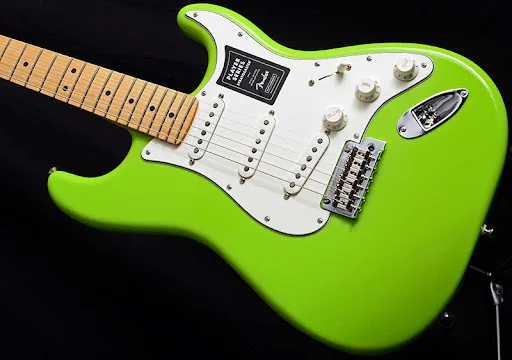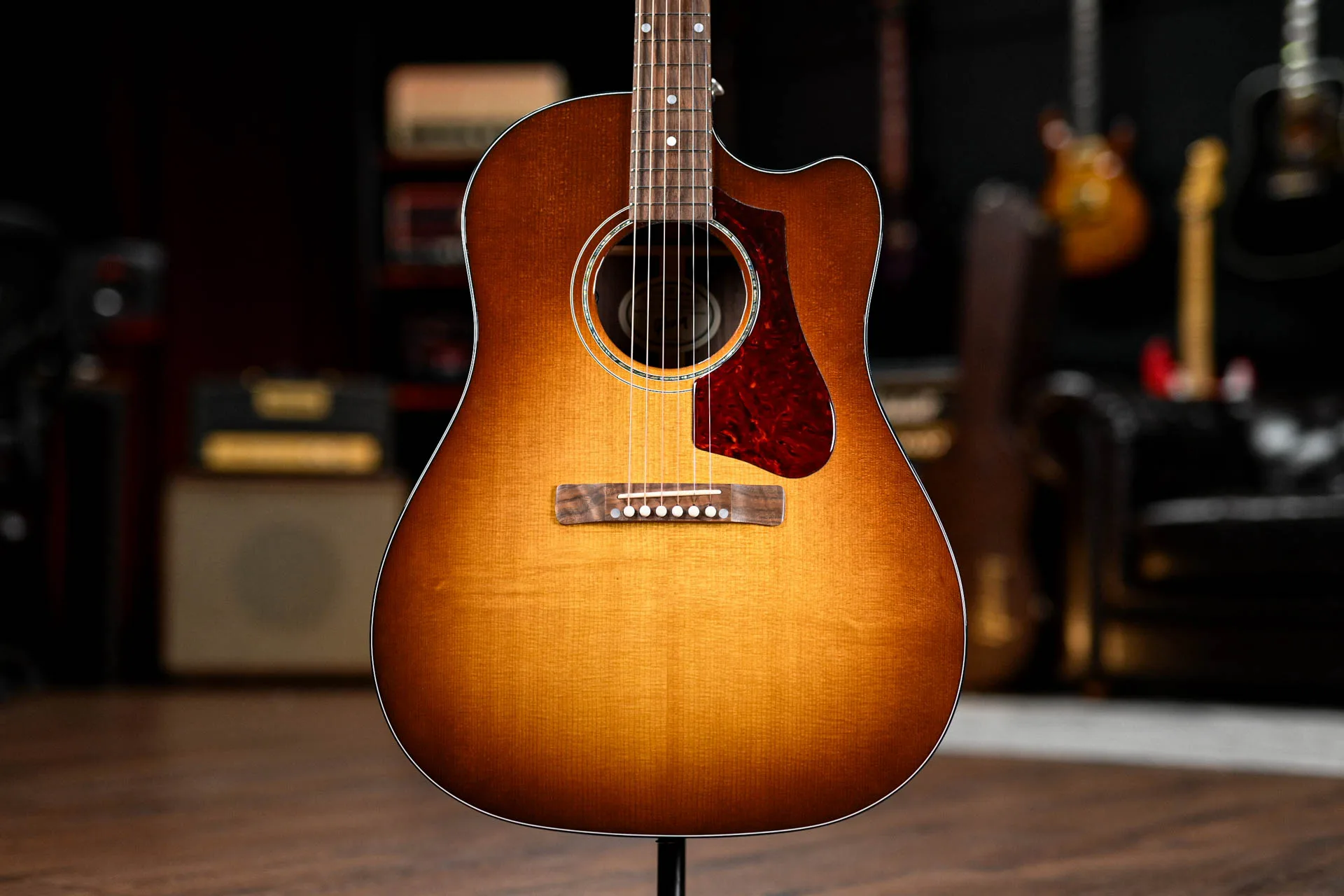Are you on the hunt for a new guitar but feeling overwhelmed by all the options out there? I get it, choosing the perfect instrument can be tough. You want something that not only looks good but also sounds amazing. After all, what’s the point of having a guitar if it doesn’t produce beautiful music? That’s why I’m here to help.
In this article, we’ll explore some of the best guitars with top-notch sound quality and give you tips for selecting the perfect one for your needs. Whether you’re a beginner or an experienced player looking to upgrade, we’ve got you covered. So let’s dive in and discover which guitar has the best sound quality!
So, Which guitar has the best sound quality?
The answer to this question is subjective as it ultimately depends on personal preference and playing style. However, some of the top guitars known for their exceptional sound quality include Martin D-28, Gibson J-45, Taylor 814ce, and Fender Stratocaster.
When choosing a guitar with great sound quality, there are a few factors to consider. First and foremost is the type of wood used in the construction of the guitar’s body. Different types of wood produce different tones and resonance, so it’s important to research which woods are best suited for your preferred genre or playing style.
Another factor to consider is the shape and size of the guitar. Acoustic guitars with larger bodies tend to have a fuller sound while smaller-bodied guitars can be more versatile for various playing styles.
Additionally, paying attention to the hardware such as pickups (for electric guitars) and tuning machines can also impact sound quality. High-quality hardware can enhance tone and sustain while low-quality components may negatively affect overall sound.
Ultimately, when looking for a guitar with excellent sound quality, it’s important to try out multiple options before making a decision. What sounds great on paper may not necessarily feel or sound right when played by an individual musician. Trust your ears and choose a guitar that speaks to you personally!
Understanding the Factors that Affect Guitar Sound Quality
Have you ever wondered why two guitars that look almost identical can sound completely different? It’s all about the intricate details that go into making each instrument. One major factor is the type of wood used in its construction. Different woods have distinct tonal qualities—maple tends to be bright and punchy, while mahogany offers a warmer, richer sound. The density and grain of the wood also play a role; even within the same species, no two pieces are alike.
Another critical element is the strings themselves. The gauge (thickness) affects both feel and tone; lighter strings are easier to press but produce a thinner sound, whereas heavier strings offer more depth but require stronger fingers. Material matters too—nickel-plated steel strings deliver a balanced tone for rock music, while pure nickel produces vintage warmth perfect for blues or jazz.
Then there’s how you actually play it—the technique makes a huge difference! Fingerstyle can bring out subtle harmonics you might miss with a pick. Your picking hand’s position relative to the bridge alters timbre: closer creates sharper tones; farther yields softer ones.
Understanding these factors helps players make informed choices when selecting gear or developing their own unique style.
- Wood Type: Maple vs Mahogany
- String Gauge & Material: Light vs Heavy Strings
- Playing Technique:
So next time you’re strumming away, take note of what you’re using—it could transform your entire musical experience!
Exploring Different Types of Guitars and Their Sound Qualities
Guitars are magical instruments, each with its unique voice and charm. When it comes to acoustic guitars, they can be quite versatile. They usually have a warm, rich sound that feels like snuggling under a cozy blanket on a chilly night. Some acoustic guitars produce bright tones, perfect for lively folk music or strumming by the campfire, while others offer deep, resonant sounds that suit soulful ballads beautifully.
On the other hand, electric guitars open up an entirely different world of possibilities. These bad boys need an amplifier to sing their best songs but once plugged in, they truly shine. The tone can range from clean and crisp to wild and distorted; think of the classic rock riffs that get everyone on their feet! Electric guitars often come with multiple pickups allowing players to switch between varied sound profiles effortlessly.
For those interested in something truly exotic:
– Consider trying out a classical guitar with nylon strings which provide soft and mellow tones.
– Or explore the twangy delight of a 12-string guitar, offering lush harmonics unlike any other instrument.
Each type brings something special to your music-making journey, inviting you into new realms of creativity where every strum tells its own story.
Read also: yamaha acoustic guitar fg700s
Reviewing Our Top Picks for Best Sounding Guitars
When it comes to discovering the perfect sound from an acoustic guitar, there’s an entire world of choices that can leave you feeling a bit overwhelmed. Each model seems to offer something different in its tone and playability. Let’s start with one of our favorites: the Martin D-28. This classic instrument stands out with its rich, full-bodied sound that’s equally suited for both strumming and fingerpicking. The vibrant tones produced by this guitar are unmatched, thanks to its solid Sitka spruce top and East Indian rosewood back and sides. It’s no surprise that legends like Bob Dylan have chosen this very model.
Another gem worth mentioning is the Taylor 814ce, known for its bright, crisp notes and incredible balance. The combination of a solid Engelmann spruce top with Indian rosewood ensures every chord rings clear as day, making it ideal for all genres—from folk to pop. Plus, Taylor’s signature V-Class bracing enhances sustain while providing excellent intonation across the fretboard. Whether you’re performing on stage or just jamming at home, these guitars deliver exceptional sound quality that speaks volumes about their craftsmanship.
- Rich tones
- Vibrant resonance
- Balanced acoustics
Each strum reveals another layer of beauty in these carefully crafted instruments.
In essence, investing time into finding your sonic match among top-tier guitars like the Martin D-28 or Taylor 814ce promises not only stellar performances but also countless moments where music truly comes alive under your fingertips.

Tips for Choosing a Guitar with Superior Sound Quality
When you’re searching for a guitar with superior sound quality, it’s crucial to consider the material and build of the instrument. The wood type plays a significant role in shaping the sound. Mahogany, for instance, offers warmth and resonance, while maple delivers brightness and clarity. Additionally, look at how well-crafted the body is; an evenly constructed guitar will produce better vibrations, resulting in richer tones.
Moreover, don’t overlook the importance of testing out different guitars before making your choice. Take note of how each one feels in your hands – comfort can affect your playability which in turn influences overall sound quality. Pay attention to the strings as well; some materials offer more sustain than others.
- Nylon strings: Softer sound best suited for classical music.
- Steel strings: Brighter tone ideal for rock or country genres.
Taking these nuances into account ensures you find a guitar that not only sounds great but also suits your playing style perfectly.
Also worth noting are other key components such as pickups if you’re opting for an electric model. Different pickup types like single-coil or humbucker translate string vibrations differently into electrical signals — impacting tone significantly. Listen carefully to demos using both clean and distorted settings so you have a clear idea about its tonal range under varied conditions.
The goal is simple: trust what resonates most deeply with you because ultimately it’s about creating beautiful music that inspires joy every time you strum those chords!
You may also like: bush and lane piano
Finding Your Perfectly Sounding Guitar
Choosing the right guitar feels a bit like finding your musical soulmate. It’s all about how it sounds when you strum those first few chords and whether it resonates with your unique style. You’ll want to try different sizes, shapes, and woods to discover which combination sings to you. Sometimes, it’s an acoustic that whispers soft melodies; other times, an electric guitar might scream out rock anthems just the way you imagined.
Here are some tips for exploring:
- Listen closely: Pay attention to the tone of each note.
- Feel the neck: Your hands should glide comfortably over it.
- Check for balance: It shouldn’t feel too heavy or lopsided in your lap.
Take your time experimenting with a variety of guitars at local shops or online if necessary. Don’t be afraid to ask questions—often, shop owners have valuable insights that can guide you toward finding “the one.” Whether you’re drawn by deep bass notes or bright trebles, focus on what makes you feel inspired. Each strum should make your fingers tingle with excitement!
Remember to consider not just the sound but also how it feels against you when playing. A well-fitted guitar is almost like wearing a comfortable piece of clothing—it allows freedom while still offering support where needed most.
You deserve an instrument that speaks both musically and emotionally to who you are as an artist!

